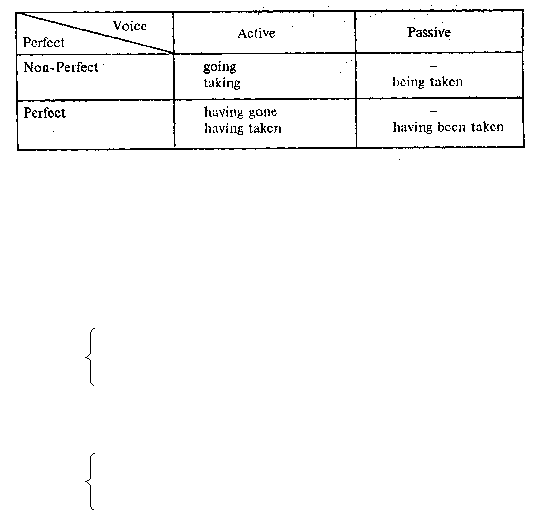
99
You surprise me, she said feelingly.
The grammatical categories of participle I
Table VII
The category of perfect
The category of perfect in participle I finds its expression in the contrast of the non-perfect and perfect
forms.
The non-perfect form suggests that the action denoted by participle I is simultaneous with that of the finite
verb. Thus the time-reference of the action expressed by participle I can be understood only from the context,
that is it is not absolute, but relative.
Learning foreign languages
you know your native tongue better.
I used to begin my day with repeating new words.
you will learn a lot about your native tongue.
The perfect form of participle I indicates that the action denoted by the participle is prior to that denoted by
the finite verb.
Having learnt the elements
of English
I shall start upon French.
our students start upon French or German.
we started upon French.
The meaning of priority may be accompanied by the notion of completion or duration, depending on
whether the meaning of the verb is terminative or durative.
Dinny took the little packet, and having brought no bag, slipped it down her dress.
Having waited several hours in the snow to see me, he was not likely to show much patience when the
house was thrown into darkness.
Like that of the other non-finites, the perfect form of participle I invariably expresses priority, whereas non-
perfect participle I varies in its meaning according to the context, expressing either a prior or a simultaneous or
a posterior action.
Non-perfect participle I regularly expresses immediate priority and denotes an instantaneous action if it is
formed from terminative verbs, such as verbs of motion (to come, to enter, to arrive, to turn, to leave), of sense
perception (to see, to hear, to find) and verbs of certain specific actions associated with motion (to put, to put
on, to take, to take off, to seize, to grasp, to open).
Arriving at the station, he found his train gone.
Leaving the house, Andrew continued his round.
Turning the comer, you’ll see the house you are looking for.
Hearing a noise in the garden, I looked out of the window.
Taking off our shoes, we tiptoed into the nursery.

